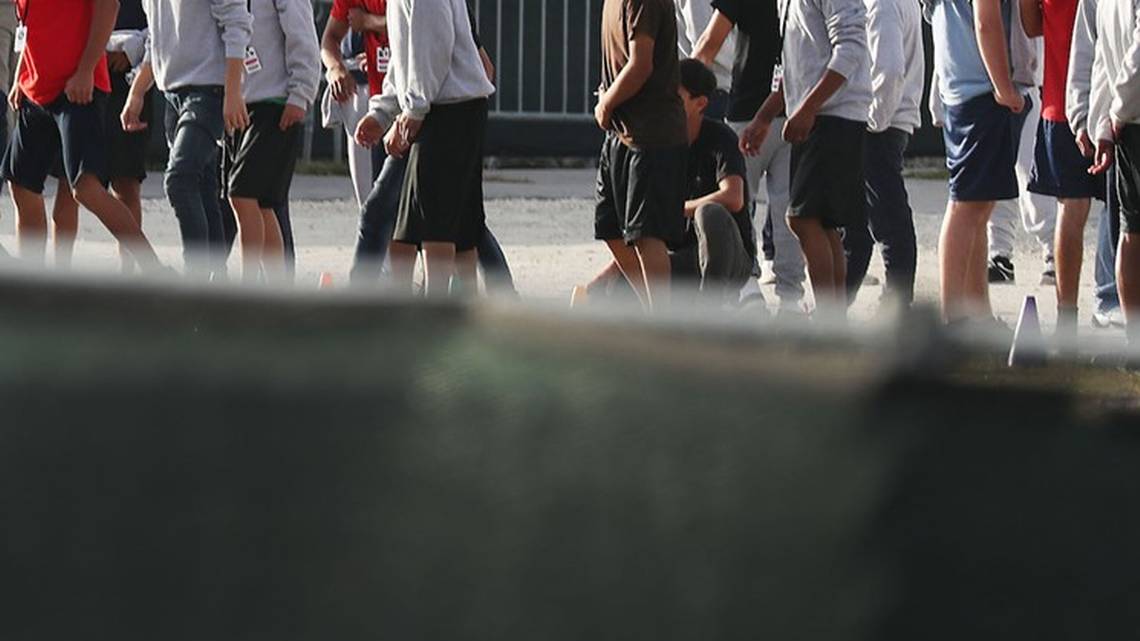
Children at the Homestead detention center for unaccompanied migrants have no recreation space outdoors. JOE RAEDLE GETTY IMAGES
I recently visited the area surrounding the migrant detention center in Homestead. Initially, I went in my capacity as chair of the Community Relations Board, but my perspective quickly changed to that of a father and resident of Miami-Dade County.
Words cannot adequately describe my experience.
As I watched dozens of children and teenagers marched from building to building, I sensed I was watching a military-style procession. However, the detention center is not run by the military or even law enforcement, but by Caliburn International, a private corporation answering to its shareholders and recipients of the profits. Setting aside the politics of immigration, one has to ask whether profit-driven immigration detention centers are really best for Miami-Dade County and the United States as a whole.
As you peer over the fence into the detention center you notice it is virtually devoid of any area for physical activity, such as a basketball court, or trees or shade beyond the buildings themselves. As you talk to people who have seen the detention center’s transformation, you learn that outdoor activity areas used to exist but were removed to make way for more buildings to house more children. Curiously, this expansion is occurring even though many of the children are awaiting release to sponsors who have agreed to house them as they travel through the immigration process.
This, of course, makes sense when seen in the light of a corporate run detention center — the more children they keep at the center, the greater the profits. In fact, the detention center is paid in the range of $775 per day, per child. The best approximation is that 2,700 children are housed at the center (with a current capacity of 3,200, up from 1,350). At that number, the corporate facility is generating revenue of $2,092,500 a day, or $64,867,500 in a 31-day month. Clearly, the corporation primarily is answering to its shareholders push for profits. Therefore, any incentive to maximize the care, education and physical well-being of the detained children may be stifled.
Moreover, as you read through affidavits filed by currently and formerly detained children, you will understand the lack of human interaction and connection that exists in the detention center. For instance, the children are not permitted to touch one another. It does not take a specialist to understand the sheer importance of human touch to one’s well-being.
I am not a psychologist, but I am a father. I know the joy my children and I get when one of them runs to me for a hug. In those moments, we get to celebrate success for a good test score or successful athletic feat; comfort each other in a moment of fright or weakness, such as a thunderous storm or a difficult day at work; and form bonds that transcend words.
I see my children and their friends learning the difficulties that come with growing older. I see the bonds that are built while they braid each other’s hair, walk hand-in-hand and work their way through where and how they may ultimately fit in this world. Unfortunately, such experiences have been taken away from the detained children.
These children are human beings, and they should be given every opportunity to have the full human experience. I do not know why each of these children has come to America, but I do know that they and their families must have been desperate enough to risk potentially losing each other to come here.
Why shouldn’t the detention center be required to allow the Miami-Dade Public School District to educate the children — something that the district used to do and has said it would like to continue doing. Now, the children are being taught by Comprehensive Health Services, a subsidiary of Caliburn.
And why shouldn’t we treat the children as humans and not simply revenue generators? If we do, at worst, we may be building an ally in a foreign country should they not remain in the United States. If they do remain in this country, we are at least giving them the tools to move forward and become successful members of our community.
I encourage all members of our community to travel to the detention center to experience it for yourself. I encourage you to speak to those residents are witnessing what is happening in our own back yard about their experiences. I also encourage you to speak with your elected officials and remind them that, “In everything, do to others as you would have them do to you.”
John J. Quick is chair of the Miami-Dade County Community Relations Board.





